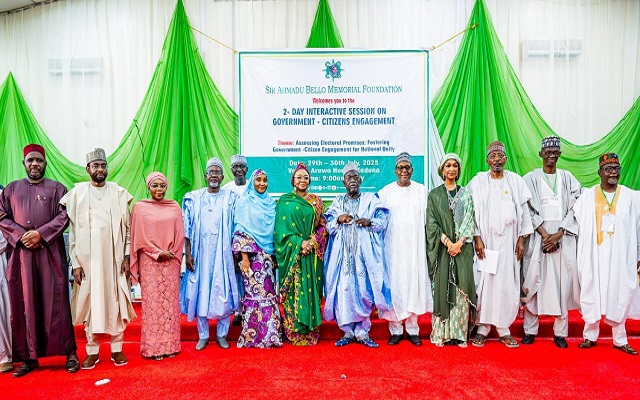At a time when digital transformation is rapidly redefining governance and citizen engagement globally, the Federal Government of Nigeria is reinforcing its resolve to harness technology as a tool for inclusive national development.
Speaking at a high-level forum in Kaduna, the Director General of the National Information Technology Development Agency (NITDA), Kashifu Inuwa Abdullahi, highlighted the administration’s unwavering commitment to deepening digital literacy, accelerating innovation, and expanding infrastructure to bridge gaps across the country.
Inuwa delivered this message at the 2-Day Interactive Session on Government–Citizens Engagement, organised by the Sir Ahmadu Bello Memorial Foundation, held at the historic Arewa House.
The forum, themed “Assessing Electoral Promises: Fostering Government Engagement for National Unity,” brought together key figures from government, civil society, academia, and the policy space to assess progress on President Bola Ahmed Tinubu’s Renewed Hope Agenda, particularly as it concerns governance delivery and citizen inclusion.
Underscoring the transformative role of technology, Inuwa stated that digital innovation is foundational to achieving the eight priority areas outlined by President Tinubu and uniting the nation through equitable access to opportunity.
“Digital technology is not a vertical sector, it is pervasive and foundational. It powers everything else and provides a framework for inclusive growth,” he said.
He described the digital economy as a cross-cutting enabler that enhances productivity across diverse sectors such as agriculture, education, healthcare, and financial services. In line with this vision, NITDA has articulated its strategic focus around three core pillars: human capital development, digital infrastructure, and innovation-driven entrepreneurship.
On human capital, the NITDA boss emphasized that Nigeria’s greatest resource is its people, and stressed that large-scale digital skill acquisition is vital to unlocking the nation’s potential.
Citing major initiatives like the 3 Million Technical Talent (3MTT) programme and the Digital Literacy for All campaign, he revealed that over 350,000 individuals in Northern Nigeria have already been trained since 2023. The ultimate aim, according to Inuwa, is to ensure that by 2027, over 70 percent of Nigerians attain at least basic digital literacy.
To meet this target, he noted, NITDA is collaborating with the Federal Ministry of Education to integrate digital skills training across all levels of the formal education system, from kindergarten through tertiary institutions.
He further disclosed ongoing engagements with the National Universities Commission (NUC) to incorporate digital literacy into the general studies curriculum across Nigerian universities.
Additionally, Inuwa explained that NITDA is partnering with the National Youth Service Corps (NYSC) to train corps members annually, positioning them as digital literacy ambassadors who will carry technology skills into underserved rural communities and the informal economy.
Speaking on infrastructure, he revealed that the Federal Government has approved the deployment of 90,000 kilometres of fibre optic cables across the country to deepen broadband penetration and drive digital inclusion.
To complement this, three digital centres are being constructed in every state, aimed at empowering underserved and unserved populations to participate in the digital economy.
Northern Nigeria, in particular, stands to gain significantly from this infrastructure push, with 13 IT Community Centres, 101 Digital Economy e-Learning Centres, and one Cybersecurity Research Centre already established in the last two years.
Inuwa also highlighted the surge in international investor confidence, attributing it to the favourable investment climate created by President Tinubu’s ongoing reforms. Global technology giants such as Google and Microsoft are already making significant inroads with new investments in Nigeria’s digital landscape.
Looking ahead, he announced that Nigeria will host two major international technology events in the coming months: GITEX Nigeria in September and the United Nations’ ICT for Governance (ICEGOV) Summit in November.
These events, Inuwa said, are expected to draw global innovators and investors, positioning Nigeria as a rising digital hub on the African continent.

